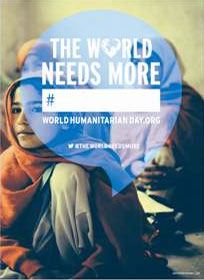 World Humanitarian Day is an opportunity to celebrate the spirit that inspires humanitarian work around the globe.
World Humanitarian Day is an opportunity to celebrate the spirit that inspires humanitarian work around the globe.
19 August 2013 – When we talk about the World Health Organization’s work in the Eastern Mediterranean Region, our focus is usually on the millions of people affected by war and natural disasters and in need of humanitarian assistance. We highlight their plight and keep them in the spotlight because as long the world is made aware of their suffering, we can count on getting the support we need to reach them.
Today, on World Humanitarian Day, we honour the people who help other people – the humanitarian aid workers who dedicate their lives to serving those in need. From the vaccinator who cycles through dirt roads and hikes up mountain paths in Afghanistan to immunize children against disease, to the epidemiologist in the Syrian Arab Republic who monitors cases of infectious diseases among internally displaced persons, to the trauma surgeon in a field hospital in Somalia – these are the individuals who dedicate their lives to helping others.
World Humanitarian Day was designated by the General Assembly to coincide with the anniversary of the 2003 bombing of the United Nations headquarters in Baghdad, Iraq, which killed 22 UN staff, including our late WHO colleague, Nadia Younes. Each year on 19 August, we take a moment to remember those who have lost their lives, and recognize those who continue to face danger and adversity every day in order to help others.
Despite international laws and conventions calling for their safety and protection, humanitarian aid workers risk their lives every day, especially those working in our Region, where the majority of attacks take place. Health workers conducting vaccination campaigns in Pakistan continue to face serious threats of violence, while health workers in many areas of the Syrian Arab Republic are often unable to report to work due to insecurity. Just last week, Médecins Sans Frontierès announced that it is withdrawing its operations from Somalia, stating that the country is one of the most difficult and dangerous environments in the world for aid workers.
The range and scale of humanitarian crisis around the world is alarming. Global humanitarian action in mid-2013 has entered uncharted territory in terms of the number of people needing help and resources to be secured, mainly as a result of the crisis in the Syrian Arab Republic, where almost 6.8 million people inside the country and 5.3 million Syrian refugees in the neighbouring countries are in need of humanitarian assistance. Overall, more than 42 million people in 13 countries in the Eastern Mediterranean Region are currently affected by emergencies resulting from political conflict and natural disasters.
To ensure that these populations are provided with one of their most basic rights – the right to health – WHO works with Member States in the Region to strengthen national health systems; intensify action to prevent communicable diseases (including poliomyelitis); improve access to essential medicine supplies for managing chronic diseases such as diabetes, heart disease and cancers; ensure access to maternal, reproductive and child health and nutrition; and support emergency response operations and reconstruction of affected health systems.
The need for increased funding impacts our efforts to reach affected populations. In Yemen and Somalia, for example – countries experiencing some of the worst humanitarian crisis – only 24%–27% of the funding requirements for the health sector have been met in 2013, leaving millions still struggling to gain access to even the most basic health services.
If we are to meet the needs of an increasing number of affected populations, we must do things differently. We need to reach out to and engage with new partners and supporters. This year’s World Humanitarian Day campaign is a chance to do that.
At the heart of this campaign is a first-of-its-kind project that will literally turn words into aid for people affected by crises. Words are incredibly powerful: they can end wars and rally millions of people behind causes. We are asking organizations, companies and individuals to donate funds to match the total number of times sponsored words are shared on social media. By requesting that words be backed by resources, we will garner donor support for some of the world’s most critical yet underfunded crises.
Dr Ala Alwan
WHO Regional Director for the Eastern Mediterranean


